To Market, To Market: Farmer’s Markets 101
For most people, a weekly grocery run may not seem like something to look forward to. I, on the other hand, anticipate my Saturday trip to the farmer’s market as much as any other weekend activity I might have planned.
My college roommate recently informed me that she has discovered a farmer’s market near her home (yay!) and asked if I had any tips for first-timers. Halfway through my response to her, I realized that info might be useful for a wider audience as well.
As I’ve alluded to before, I decided a couple of years ago that I wanted to spend my food dollars as locally as possible and have been striving toward that goal ever since. I’ve been fortunate to live in areas that support vibrant networks of farms and farmer’s markets, and I’ve shopped some of them regularly, some of them as an occasional change of pace. I’ve even taken to visiting markets in new cities when I go on vacation (doesn’t everyone?), and the variety amongst them is both astonishing and refreshing.
So for Sarah, and for anyone else out there who might be thinking about trying out your local farmer’s market, here’s what I’ve learned:
Go. Early.
Most markets open one or two days a week for a specific block of time, say, 8am-1pm. But remember, it’s not like the grocery store. Market vendors typically harvest only what they think they can sell that week to avoid wasting valuable produce, so if they’ve done their job right, they should be almost sold out of many products as the market hours end. You may be able to get a sweet deal on the last two onions, but you probably missed the berries and the fresh eggs. So get your bum outta bed and get to the market as early as you can!
Bring cash.
Again, this is not a grocery store. I’ve seen a few larger farms that are able to process credit and debit cards at markets, but most vendors operate with a cash box and a change drawer.
Make the rounds.
To this day, I still sometimes make the mistake of skipping this step and kicking myself for it later. Farmers base their prices on many factors, so the blueberries at one stand might vary dramatically in price from those at the next. Give yourself an extra 10 minutes at the beginning of your trip to walk through the entire market to see what is available and how much it costs. This way, you can be fully informed about what the harvest has to offer and can plan exactly how you want to spend your cash.
Try something new.
You can buy a Yukon Gold potato anywhere. But when was the last time you saw red flesh or blue flesh potatoes at the grocery store? A purple tomato? Yellow cauliflower? The number of fruits and vegetables I’ve learned about just walking though the farmers’ booths is growing every week. Take a chance and try something you’ve never cooked with before. You may just find a new favorite.
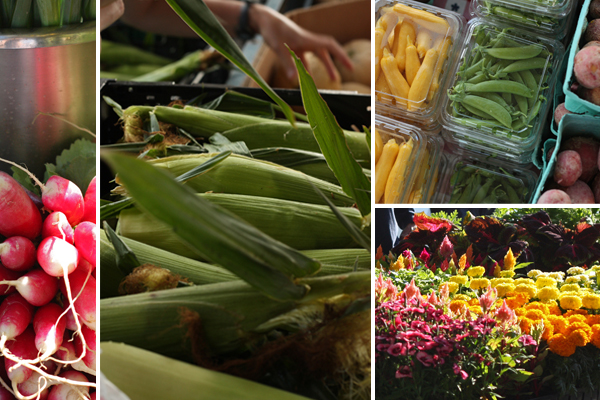
Avoid buying more than you can use.
You’ll see rows and rows of berry cartons. Piles of fresh corn. Teetering pyramids of melons and squash. Don’t get me wrong, I’m all for fresh fruit and veggies, but buying twenty pounds of it doesn’t do you a bit of good if you can only eat ten pounds before it goes bad.
Ask questions.
Most of the farmers you’ll find at the market are there because they are committed to a local food economy, providing fresh produce to their neighbors, and restoring heirloom varieties to our collective palette. They are usually not only passionate about the things they grow, but quite knowledgeable. Don’t know how to cook Swiss chard? You’ll probably get the farmers favorite recipe if you ask. Not sure how to harvest a dill seedling you’re buying? Chances are they’ve grown enough dill to pickle the world, and can tell you how to do the same.
Yes, some prices may seem high**.
This is a tricky one, especially since everyone is on a tight budget these days. While market prices for certain products are often surprisingly comparable to their grocery store counterparts, the truth is this: you’re going to hand over more cash for six peaches, a pound of sausage, a dozen eggs, at the farmers market than you would for those products at the store down the road. However, those peaches you buy will be picked fresh and ripe, the eggs of higher quality, and the dollars you spend will directly benefit the farmers and their staff.
** Our nation’s food costs are hugely misleading. This is a bigger issue for another day.
Remember, you’re not just feeding yourself.
You’re building community. You’re learning more about where your food comes from and who is growing it. You’ll come to better appreciate food when it’s actually in season. You’re fueling the work of small-scale farmers and local food artisans in your own neighborhood.
Making the choice to buy your food locally is not a simple one. Some towns and cities may not even have a farmers market. But more and more are popping up all over, and chances are, you’re closer to one than you think. Check it out. I think you’ll like it.
Do you shop at a farmer’s market? What’s it like? What’s in season where you live?

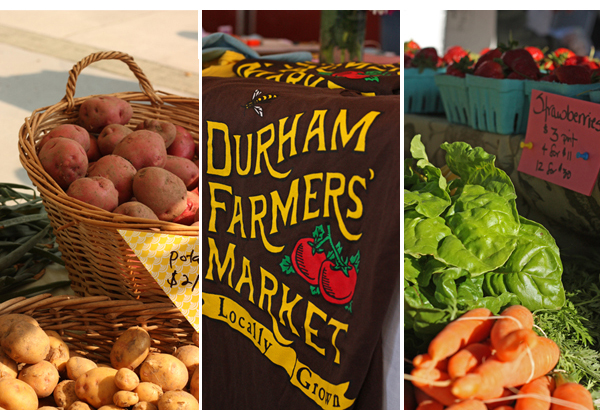
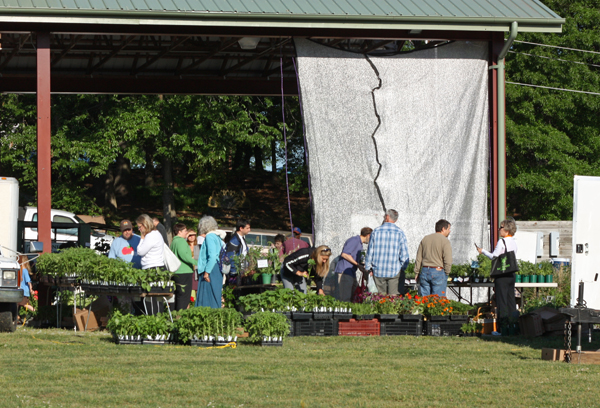
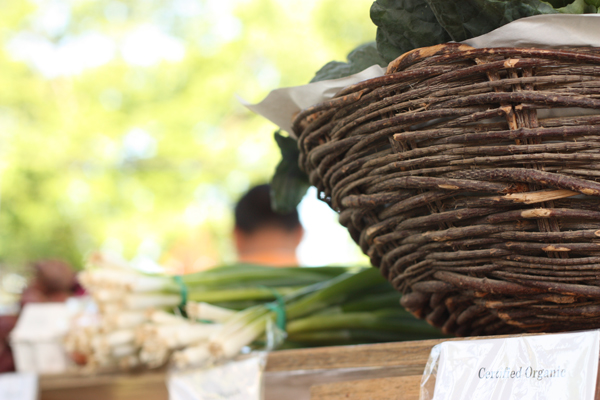
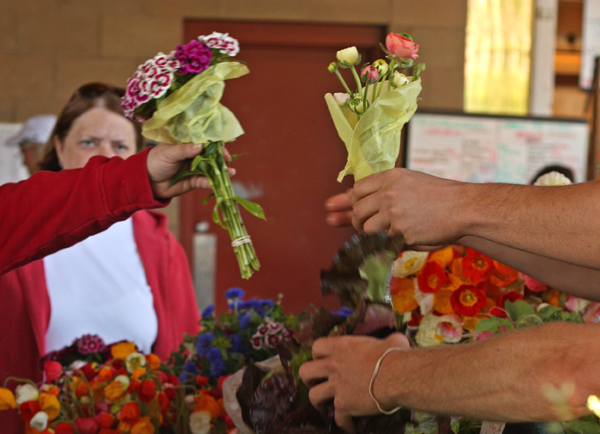
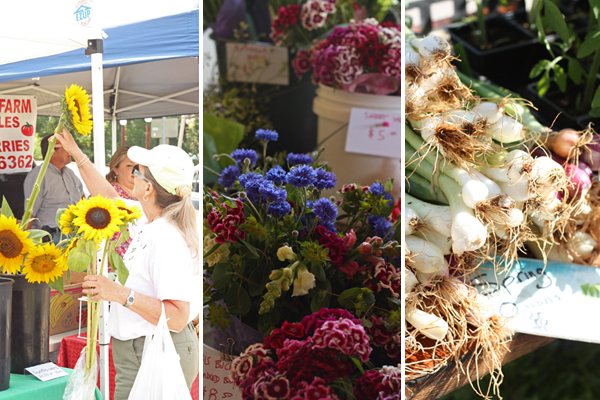
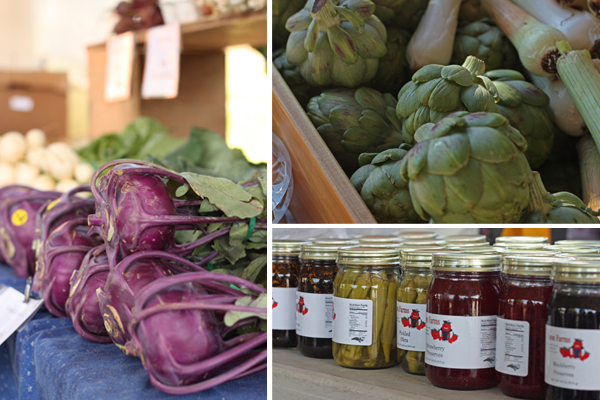
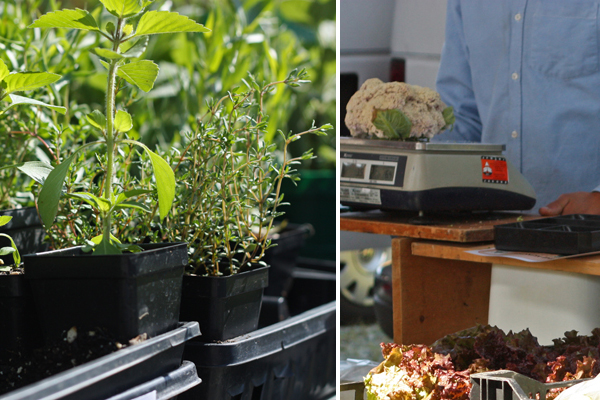
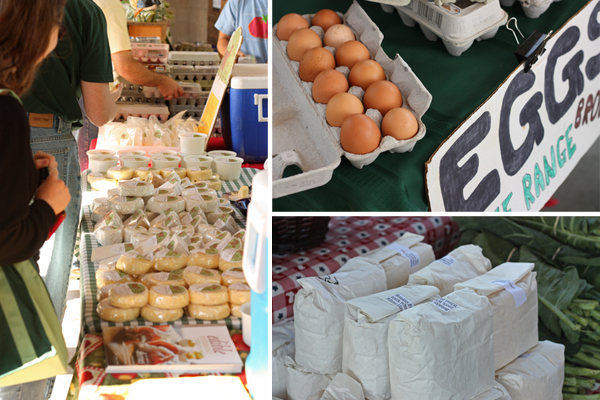

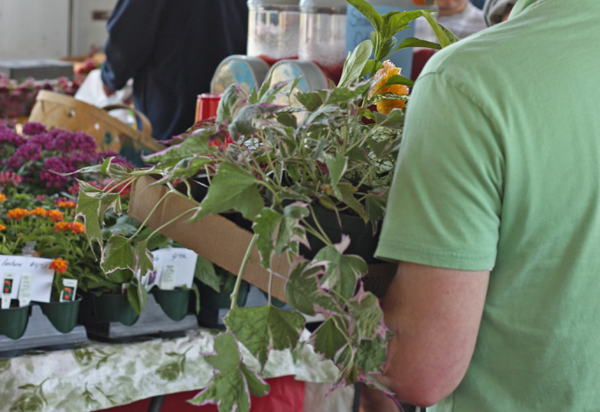
Kate
July 7, 2011 @ 11:10 am
I shop a tiny farmer’s market in one of my towns – and I honestly go for the experience of buying food out in the sunshine as much as I do for the actual produce. It’s fun! It’s community!
Sarah
July 7, 2011 @ 11:11 am
Thanks roomie :) I’m hoping to eventually grow most of my own food myself. Chris’s family raises cattle, so all the beef we eat is already local! I’m excited to continue to localize my pantry by visiting farmer’s markets. There are apparently more around than I thought-some close to me, others not-so-close…If anyone else from the Cincinnati area happens to read this blog, there are farmer’s markets in Anderson, Milford, Batavia, Wyoming, Hyde Park…and the list goes on. You can find them if you click the links on this blog in reference to farmer’s markets.
Scott
July 8, 2011 @ 3:24 pm
Whenever you make it out to Madison, you’ll have to try to get here before/during Saturday morning. We claim to have the largest producer-only farmer’s market in the whole country! We also have several restaurants that feature or limit themselves to local ingredients.
Kristi @ 30 Pounds of Apples
July 9, 2011 @ 9:48 am
I would love to! Will definitely aim to be in Madison by Sat AM when I plan my trip :)
Sara
July 15, 2011 @ 11:50 pm
To “Bring Cash” I would add, bring small bills if you can. Vendors usually have some small bills to make change, but they’ll appreciate not having to use all their change to give you back $17 of your $20.
If you’re the 50th person that day to pay with a $20 bill, you might just have to buy $20 worth of veggies! :)